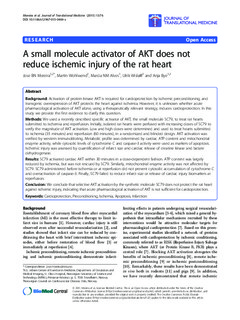| dc.contributor.author | Moreira, Jose Bianco Nascimento | |
| dc.contributor.author | Wohlwend, Martin | |
| dc.contributor.author | Alves, Marcia Netto Magalhaes | |
| dc.contributor.author | Wisløff, Ulrik | |
| dc.contributor.author | Bye, Anja | |
| dc.date.accessioned | 2019-11-25T07:11:22Z | |
| dc.date.available | 2019-11-25T07:11:22Z | |
| dc.date.created | 2015-09-17T10:51:19Z | |
| dc.date.issued | 2015 | |
| dc.identifier.citation | Journal of Translational Medicine. 2015, 13 (1) | nb_NO |
| dc.identifier.issn | 1479-5876 | |
| dc.identifier.uri | http://hdl.handle.net/11250/2630154 | |
| dc.description.abstract | Background
Activation of protein kinase AKT is required for cardioprotection by ischemic preconditioning, and transgenic overexpression of AKT protects the heart against ischemia. However, it is unknown whether acute pharmacological activation of AKT alone, using a therapeutically relevant strategy, induces cardioprotection. In this study we provide the first evidence to clarify this question.
Methods
We used a recently described specific activator of AKT, the small molecule SC79, to treat rat hearts submitted to ischemia and reperfusion. Initially, isolated rat hearts were perfused with increasing doses of SC79 to verify the magnitude of AKT activation. Low and high doses were determined and used to treat hearts submitted to ischemia (35 minutes) and reperfusion (60 minutes), in a randomized and blinded design. AKT activation was verified by western immunobloting. Metabolic profile was determined by cardiac ATP content and mitochondrial enzyme activity, while cytosolic levels of cytochrome C and caspase-3 activity were used as markers of apoptosis. Ischemic injury was assessed by quantification of infarct size and cardiac release of creatine kinase and lactate dehydrogenase.
Results
SC79 activated cardiac AKT within 30 minutes in a dose-dependent fashion. ATP content was largely reduced by ischemia, but was not rescued by SC79. Similarly, mitochondrial enzyme activity was not affected by SC79. SC79 administered before ischemia or at reperfusion did not prevent cytosolic accumulation of cytochrome C and overactivation of caspase-3. Finally, SC79 failed to reduce infarct size or release of cardiac injury biomarkers at reperfusion.
Conclusion
We conclude that selective AKT activation by the synthetic molecule SC79 does not protect the rat heart against ischemic injury, indicating that acute pharmacological activation of AKT is not sufficient for cardioprotection. | nb_NO |
| dc.language.iso | eng | nb_NO |
| dc.publisher | BioMed Central | nb_NO |
| dc.rights | Navngivelse 4.0 Internasjonal | * |
| dc.rights.uri | http://creativecommons.org/licenses/by/4.0/deed.no | * |
| dc.title | A small molecule activator of AKT does not reduce ischemic injury of the rat heart | nb_NO |
| dc.type | Journal article | nb_NO |
| dc.type | Peer reviewed | nb_NO |
| dc.description.version | publishedVersion | nb_NO |
| dc.source.volume | 13 | nb_NO |
| dc.source.journal | Journal of Translational Medicine | nb_NO |
| dc.source.issue | 1 | nb_NO |
| dc.identifier.doi | 10.1186/s12967-015-0444-x | |
| dc.identifier.cristin | 1265020 | |
| dc.description.localcode | This is an Open Access article distributed under the terms of the Creative Commons Attribution License (http://creativecommons.org/licenses/by/4.0), which permits unrestricted use, distribution, and reproduction in any medium, provided the original work is properly credited. The Creative Commons Public Domain Dedication waiver (http://creativecommons.org/publicdomain/zero/1.0/) applies to the data made available in this article, unless otherwise stated. | nb_NO |
| cristin.unitcode | 194,65,25,0 | |
| cristin.unitcode | 1920,6,0,0 | |
| cristin.unitname | Institutt for sirkulasjon og bildediagnostikk | |
| cristin.unitname | Klinikk for hjertemedisin | |
| cristin.ispublished | true | |
| cristin.fulltext | original | |
| cristin.qualitycode | 1 | |

